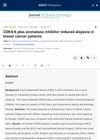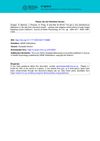 108 citations,
December 2003 in “Clinical breast cancer”
108 citations,
December 2003 in “Clinical breast cancer” PLD is an effective and safer alternative for treating breast cancer.
 67 citations,
October 2005 in “Annals of Oncology”
67 citations,
October 2005 in “Annals of Oncology” Fulvestrant is a well-tolerated new treatment for advanced breast cancer that may delay chemotherapy.
 13 citations,
August 1980 in “Cancer”
13 citations,
August 1980 in “Cancer” Multimodal primary treatment improves survival in premenopausal breast cancer patients and is also beneficial for postmenopausal women.
 3 citations,
November 2022 in “Advances in Clinical and Experimental Medicine”
3 citations,
November 2022 in “Advances in Clinical and Experimental Medicine” Electric pulse treatments for breast cancer show promise in being safer and more effective, with fewer side effects.
 January 2023 in “Mastology”
January 2023 in “Mastology” Hormone therapy for breast cancer often leads to sexual issues like vaginal dryness and decreased libido.
60 citations,
August 2022 in “ESMO Open” Trastuzumab deruxtecan is effective for HER2-positive breast cancer but requires careful management of side effects.
 3 citations,
July 2018 in “Cureus”
3 citations,
July 2018 in “Cureus” A breast cancer patient had lasting hair loss after chemotherapy, which improved with minoxidil treatment.
March 2023 in “JAAD case reports”  1461 citations,
March 2004 in “Annals of oncology”
1461 citations,
March 2004 in “Annals of oncology” Pegylated liposomal doxorubicin is as effective as conventional doxorubicin but causes fewer heart problems and side effects.
 9 citations,
January 2014 in “Annals of Dermatology”
9 citations,
January 2014 in “Annals of Dermatology” Some breast cancer patients on hormonal therapy may develop male or female pattern hair loss, which can sometimes be improved with topical treatments.
 4 citations,
May 2019 in “Journal of Clinical Oncology”
4 citations,
May 2019 in “Journal of Clinical Oncology” Some breast cancer treatments cause hair loss similar to male pattern baldness, which can be improved with minoxidil.
 2 citations,
March 2021 in “Cutis”
2 citations,
March 2021 in “Cutis” Some breast cancer treatments, like taxanes, can cause long-term hair loss.
 68 citations,
April 2014 in “Journal of Molecular Endocrinology”
68 citations,
April 2014 in “Journal of Molecular Endocrinology” The document concludes that targeting the androgen receptor may be a promising breast cancer treatment, especially for certain types.
 90 citations,
December 2007 in “Current Oncology”
90 citations,
December 2007 in “Current Oncology” Non-hormonal treatments should be used first for sexual dysfunction in postmenopausal breast cancer patients on aromatase inhibitors, with hormones as a second option.
 1 citations,
August 2017 in “Semiotica”
1 citations,
August 2017 in “Semiotica” The paper concludes that breast cancer treatment involves complex interactions between medical symptoms, patient experiences, and commercial influences, requiring a holistic approach.
 5 citations,
June 2022 in “Frontiers in Endocrinology”
5 citations,
June 2022 in “Frontiers in Endocrinology” Research from 2011 to 2020 shows androgen receptors could be key for prognosis and treatment in certain breast cancers.
 21 citations,
March 2019 in “Critical Reviews in Clinical Laboratory Sciences”
21 citations,
March 2019 in “Critical Reviews in Clinical Laboratory Sciences” The androgen receptor is a promising target for breast cancer treatment, especially in triple-negative cases, but more research is needed for personalized therapies.
 September 2023 in “Curēus”
September 2023 in “Curēus” Reproductive hormones play a crucial role in breast cancer development and treatment challenges.
 67 citations,
April 2018 in “JAMA Dermatology”
67 citations,
April 2018 in “JAMA Dermatology” Hair loss from hormone therapy in breast cancer patients can be improved with minoxidil treatment.
August 2021 in “The journal of investigative dermatology/Journal of investigative dermatology” Hair growth supplements do not reduce the effectiveness of the breast cancer treatment tamoxifen.
 March 2024 in “Frontiers in genetics”
March 2024 in “Frontiers in genetics” Different types of fibroblasts play specific roles in wound healing and cancer, which could help improve treatments.
 February 2024 in “PloS one”
February 2024 in “PloS one” Nutraceuticals that promote hair growth do not reduce tamoxifen's effectiveness in breast cancer treatment.
23 citations,
December 2013 in “Molecular cancer therapeutics” Breast cancer treatments work better with AR activation, improving results and reducing side effects.
 34 citations,
November 2013 in “Breast Cancer Research and Treatment”
34 citations,
November 2013 in “Breast Cancer Research and Treatment” Aromatase inhibitor therapy for breast cancer increases the risk of hair loss and thinning.
 6 citations,
September 2017 in “Journal of health psychology”
6 citations,
September 2017 in “Journal of health psychology” Women who had cancer treatment feel both positive and negative about their bodies.
 1 citations,
February 2018 in “Journal of Nursing UFPE on line”
1 citations,
February 2018 in “Journal of Nursing UFPE on line” Hair loss during breast cancer treatment affects each woman differently, influenced by her environment and family.
 1 citations,
November 2019 in “Archives of breast cancer”
1 citations,
November 2019 in “Archives of breast cancer” Some hormone treatments might raise breast cancer risk, while others don't seem to.
 February 2013 in “Journal of The American Academy of Dermatology”
February 2013 in “Journal of The American Academy of Dermatology” Hair loss is a common but often unreported side effect of cancer treatments, especially for breast and prostate cancers.
 7 citations,
September 2023 in “Cancer Treatment Reviews”
7 citations,
September 2023 in “Cancer Treatment Reviews” Managing side effects of endocrine therapy is crucial to improve adherence and survival in breast cancer patients.
September 2016 in “Oncology times” Breast cancer survivors often face body image and sexual health issues, needing ongoing support and open communication with healthcare providers.

























